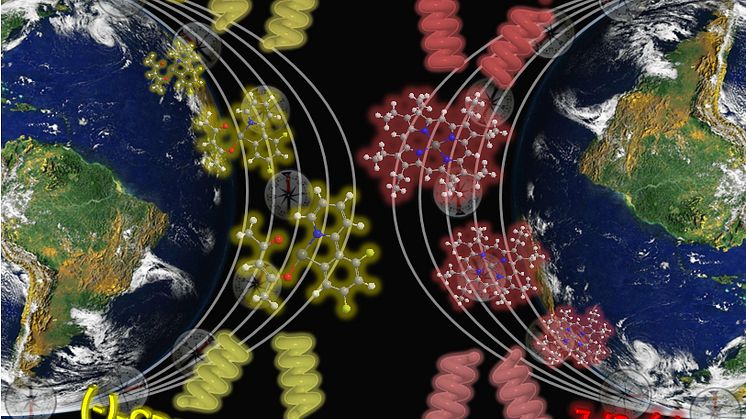
Press release -
Developed a new way to generate “Circularly Polarized Luminescence” required for 3D projection Likely to lower manufacturing cost of organic EL panels for 3D display -- Kindai University
A research group led by Assoc. Prof. Dr. Yoshitane Imai (Department of Applied Chemistry, Faculty of Science and Engineering, Kindai University), Prof. Dr. Shigeyuki Yagi (Department of Applied Chemistry, Graduate School of Engineering, Osaka Prefecture University), Ken-ichi Yamashita (Department of Chemistry, Graduate School of Science, Osaka University) succeeded in generating “circularly polarized luminescence (CPL)”, which oscillates and rotates in a spiral manner and is used for 3D projection, through a novel method of applying external magnetic force to platinum complexes *1. This new method allows for manufacturing cost reduction for circularly polarized luminophores, and thus potentially lowers the production costs of organic EL panels for 3D display. It is also expected that this enables advanced next-generation security/authentication technologies.
This research was published online in the “Chemistry – An Asian Journal”, along with a picture on the cover of the issue, on Tuesday, March 31 st, 2021. “Chemistry – An Asian Journal” is published by Wiley, an American academic publishing company.
https://onlinelibrary.wiley.com/doi/10.1002/asia.202100172
Key points:
- Under external magnetic field, circularly polarized luminescence (CPL) was successfully generated from achiral *2 platinum complexes at room temperature.
- By changing the geometries of the magnetic field, the CPL rotation direction can be controlled; succeeded in selectively generating right-handed and left-handed CPL.
- Expected to reduce manufacturing costs of organic EL panels for 3D display, and practical applications for advanced next-generation security/authentication technologies.
About publication:
- Journal name:
Chemistry-An Asian Journal
(Impact factor: 4.056/2019-2020)
- Research paper title:
Magnetic circularly polarized luminescence from PtIIOEP and F
2-ppyPtII(acac) under North-up and South-up Faraday geometries
- Authors
Kana Matsudaira (Department of Applied Chemistry, Faculty of Science and Engineering, Kindai University)
Yuki Mimura (Department of Applied Chemistry, Faculty of Science and Engineering, Kindai University)
Hotei Junichi (Department of Applied Chemistry, Graduate School of Engineering, Osaka Prefecture University)
Shigeyuki Yagi (Department of Applied Chemistry, Graduate School of Engineering, Osaka Prefecture University)
Ken-ichi Yamashita (Department of Chemistry, Graduate School of Science, Osaka University)
Michiya Fujiki, (Graduate School of Science and Technology, Nara Institute of Science and Technology)
Yoshitane Imai* (Faculty of Science and Engineering, Kindai University)
*Corresponding author
*1 Platinum Complex: Platinum is lustrous white metal itself. Used for many purposes including jewelry, catalysts, and medical applications. Platinum complexes containing organic compounds are utilized as luminophores.
*2 Achiral: A property that a mirror image of an object is superimposable on the original object.
